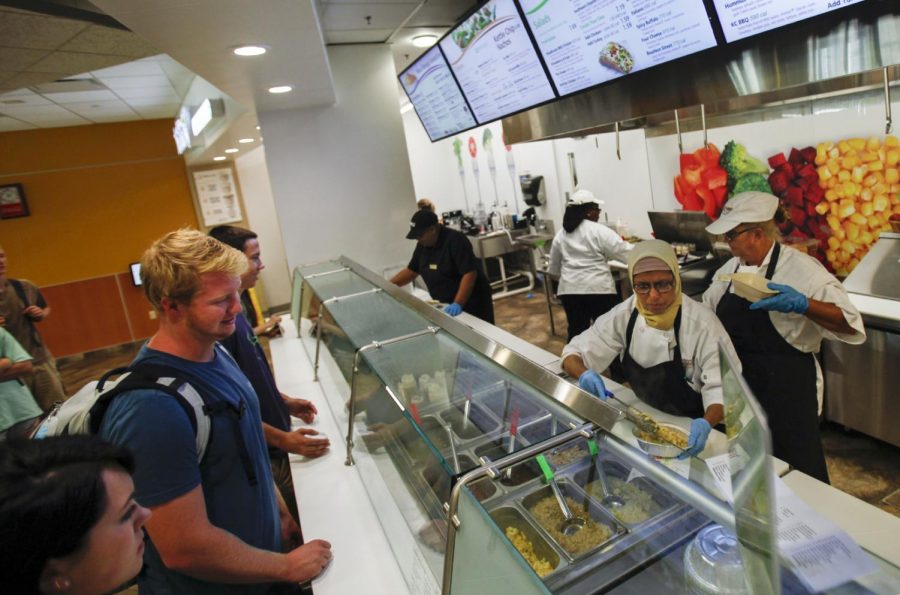Mandatory food fees could rise to $300 a semester under Aramark contract
February 16, 2018
Members of the University Senate discussed a possible cost increase to the $75 meal plan decline balance fee for students during their meeting Thursday.
Newly elected Board of Regents member Claus Ernst said former President Gary Ransdell signed a 20-year contract with food service company Aramark shortly before he left the university. The fee was to help aid in funding large renovations to Garrett Conference Center. Ernst said the per-semester fees could rise to $150 for the fall 2018 semester, and to $300 by the following fall.
“It looks like we’re going to be building another new building,” Ernst said.
WKU entered into this contract with Aramark last March. Under the contract, all full-time students not already on a meal plan are required to pay $75 per semester, which may be deducted from the cost if they choose to purchase a meal plan later.
Brian Kuster, vice president of student affairs, said, last March in an interview with the Herald, this applies only to “face-to-face” students who take 12 hours or more at Bowling Green’s main campus.
“They’re most likely already eating a meal a week or so, you know, in one of the facilities,” Kuster said. “It just supplements issues we know students already have as far as making healthy choices, having those options.”
The Senate passed a resolution last year “strongly against the contract,” University Senate chair Eric Kondratieff said, noting that the information that the Senate and the Board of Regents was given at the time was not complete.
Ernst said there could be a problem renegotiating the contract if the board chooses because it is already signed. The Senate Executive Committee recommended that the budget finance committee look at the contract “sometime in the future.”
SGA Vice President Savannah Molyneaux said the fees associated with contract with Aramark has been noted by SGA President Andi Dahmer. She said the SGA executive board plans to bring it up during their next meeting with President Timothy Caboni.
“We do not want to see these fee increases for students,” Molyneaux said. “We are not in favor of it, but we’re not sure whether it would be worth it for [Caboni] to try to go back on the signature, and the implications that could have for any future contracts the president signs.”
Ernst said there was a lot of “uncertainty” concerning numbers within the contract, including WKU’s declining enrollment rate.
The Budget Council report will be shared with Caboni “in the very near future,” David Lee, provost and vice president of Academic Affairs, said. He said Caboni will be reviewing and working with the recommendations in the next few weeks.
Along with the current $15 million shortfall the university faces, a combined deficit from pension increases, proposed state cuts and declines in enrollment places WKU at a combined $40 million deficit.
Caboni formed the Budget Council last fall to go through the budget and make recommendations on how to achieve the original $15 million reduction.
In remarks given to a House subcommittee in Frankfort earlier this month, Caboni said the council’s report would be due to him in a few weeks and by the beginning of March “we will begin the grueling task of reducing our workforce.”
Once the state budget is passed, Caboni said in his remarks that the council would have to go through the process again, which would translate to “further job loss and program elimination.”
“Ultimately, we exist to serve students in the 27 county service region that spans across south central Kentucky. Many of them are low income and the first in their families to go to college. We must position ourselves to ensure that our students can be successful, graduate and contribute to Kentucky’s economy,” Caboni said in his remarks.
Colonnade educational committee member Jerry Daday said they will be reviewing the world language proficiency requirement in an upcoming meeting. Over the past few months, representatives from the office of academic affairs created a working group with data and recommendations for the committee.
“I can’t say we’re going to come to a resolution…. but we’re going to talk about the information we’ve received from the office of academic affairs,” Daday said.
Lee gave an update on the search for the new dean for the College of Education. Lee said around 15 people so far had applied for the position.
Lee also announced that the College of Health and Human Services will have an interim dean, and said he plans to send an email to faculty and staff in the college to nominate a candidate for the position.
“Those search processes and that particular budget process are both moving along and moving towards a pretty significant stage in the process,” Lee said.
News reporter Emily DeLetter can be reached at 270-745-6011 and emily.deletter304@topper.wku.edu. Follow her on Twitter at @EmilyDeLetter.















